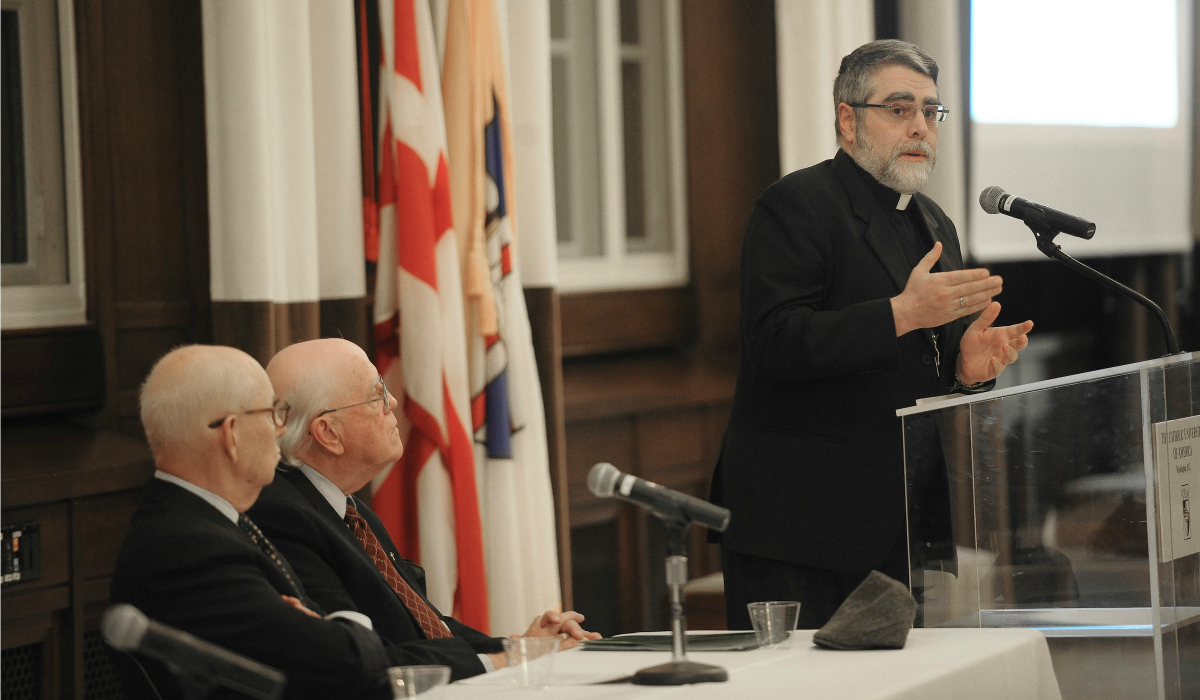

The perilous state of Christianity in the Middle East was the topic of discussion on Nov. 17, as Chaldean Bishop Francis Y. Kalabat, eparch of the Chaldean Catholic Diocese of Detroit, addressed members of the Catholic University community.
Speaking as part of a panel discussion organized by the School of Theology and Religious Studies (STRS), Bishop Kalabat explained the complexities of keeping Christianity alive in the Middle East, and the struggles of Christians who live there.
“The worst thing that can happen is if Iraq is left with no Christians,” he said. “But the worst thing to also happen would be to force people (who are suffering) to stay.”
Born in Kuwait in 1970 as an Iraqi citizen, Bishop Kalabat immigrated to the United States, and has served as the eparch of the Chaldean Catholic Diocese since June 2014. After traveling back and forth between the Middle East and Detroit many times, he believes the main problems facing Christians in Iraq result from an untrustworthy government and dangerous, uncomfortable living conditions.
Bishop Kalabat suggested that Christians in the United States “speak up all the time” about the ways military actions affect communities of Christians in the Middle East. By writing to senators and using the word “genocide,” Christians can help keep this issue from being forgotten.
He also advised Christians to celebrate Mass on behalf of Middle Eastern Christians and to keep them in mind during prayer. Because many Christian churches have been destroyed in ongoing attacks by Islamic extremists, Chaldean Catholics and other Christians rarely have the ability to participate in the Eucharist or to celebrate their faith as a community.
Bishop Kalabat was joined on the panel by Robert W. Wilken, the William R. Kenan Jr. Professor of the History of Christianity Emeritus at the University of Virginia; Sidney H. Griffith, professor emeritus for the Department of Semitic and Egyptian Languages and Literatures; and Shawqi Talia, lecturer in the same department.
Wilken spoke about the early history of Christianity, when evangelists preached the gospel in the Eastern world using the Syriac language. Griffith built upon that early history, and discussed how Christians have lived in the Middle East alongside members of the Islamic faith for centuries. Talia addressed the struggles faced by Christians in the Middle East for the last several decades, and said that many of the difficulties were a direct result of the United States’s 2003 invasion of Iraq.
“Syriac Christianity is a unique and irreplaceable culture,” Wilken said. “Its survival will not happen without the self-conscious and determined efforts of Christians to preserve it. The telling of this history should be a holy vocation for us, Christians today.”
The panel discussion was planned to coincide with the Christian Communities of the Middle East Cultural Heritage Project, a project conceived by STRS professor Robin Darling Young that preserves the memories of Chaldean Catholics who were pushed out of Iraq.
For more information on that project.
The discussion was also preceded by prayer, as members of the University’s Byzantine Student Union gathered on the lawn of the Basilica of the National Shrine of the Immaculate Conception the night before for a prayer vigil in support of Middle Eastern Christians.